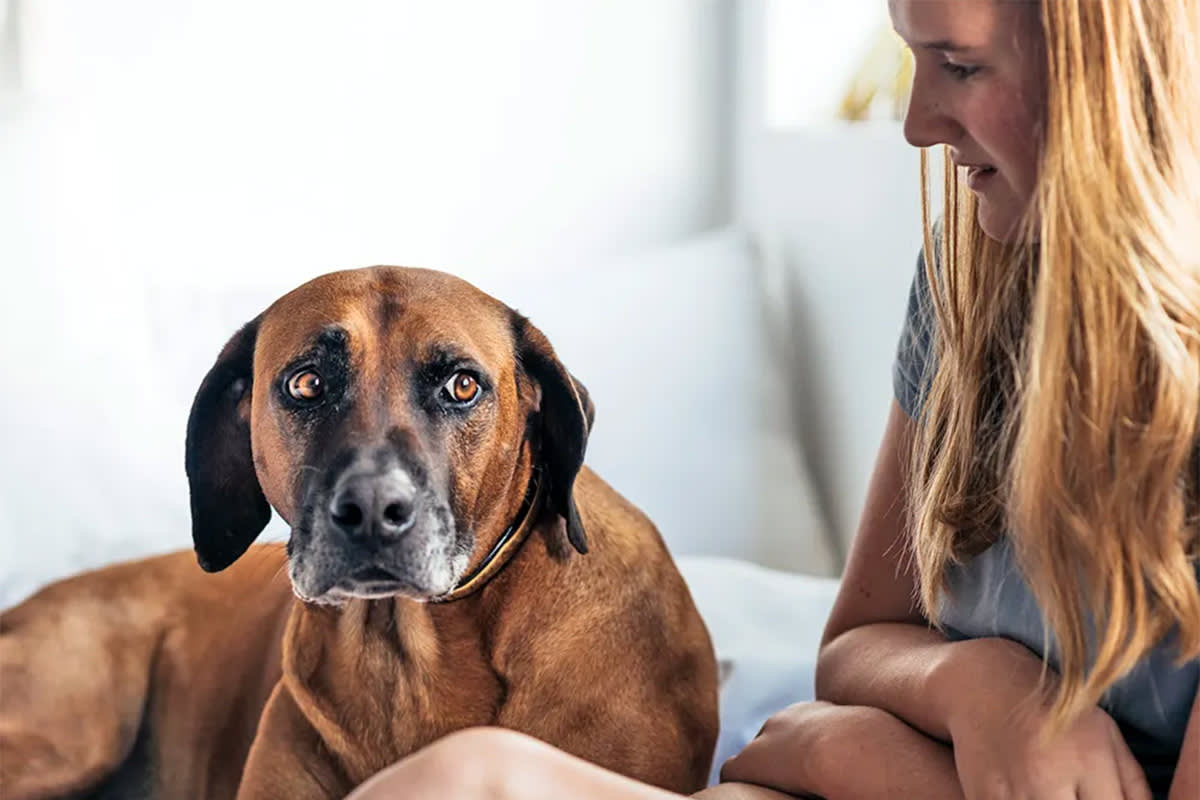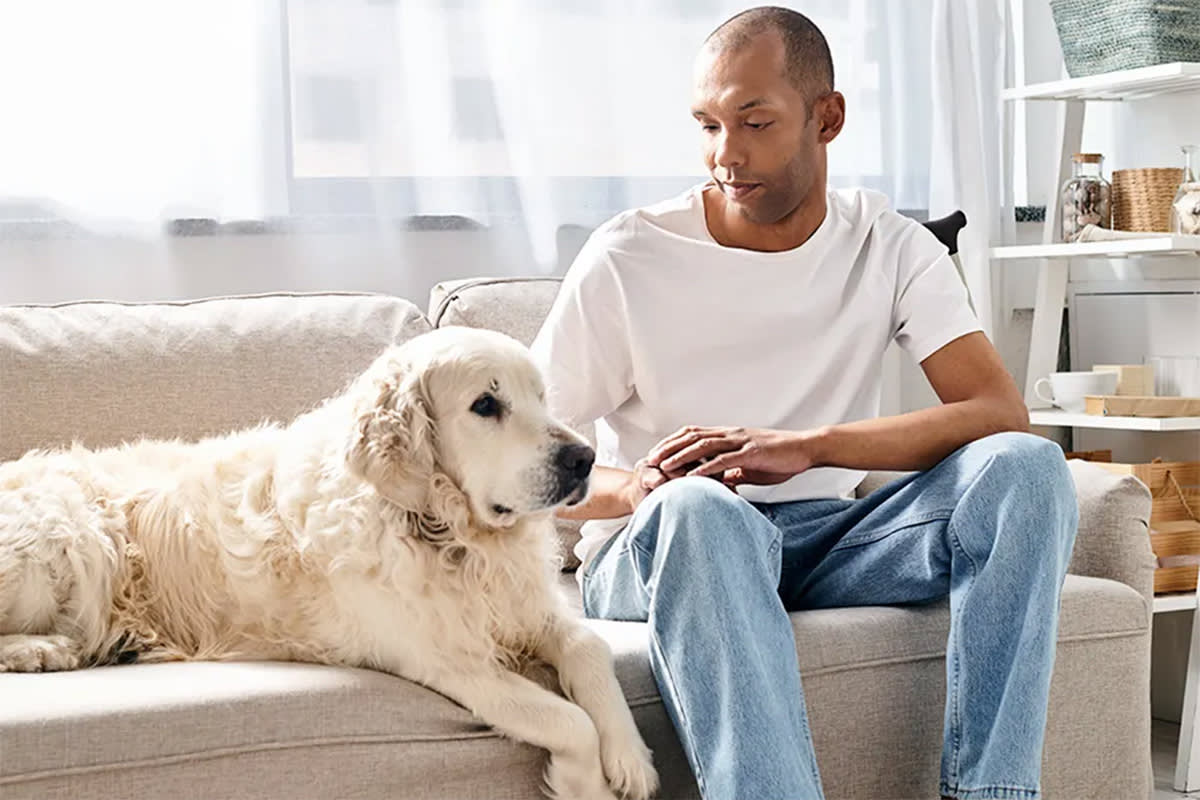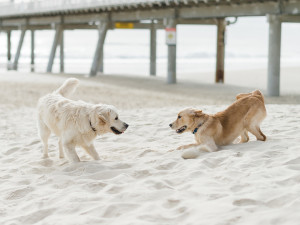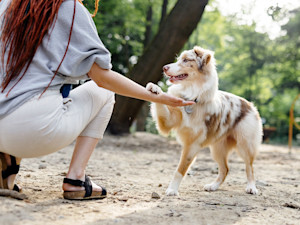The Real Reason Your Dog Is Leaving You That “Revenge Poop”
Are they really mad at you?
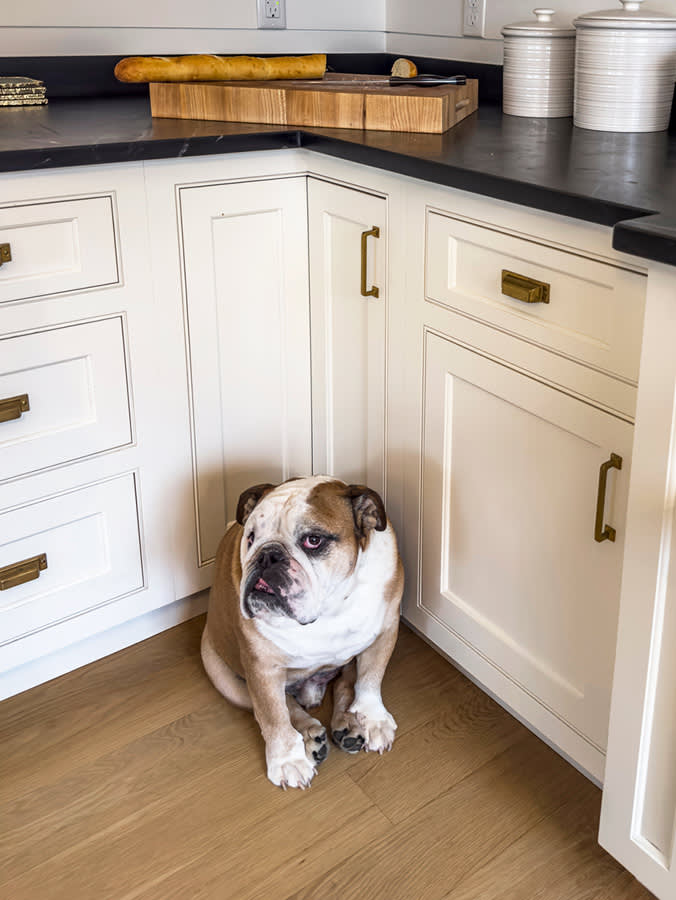
Share Article
So, you’ve had a terrible day. You’ve barely slept, because you’ve been too busy catering to the whims of a tiny dictator who also happens to be your baby. The infant never sleeps for more than a couple hours, and so you don’t, either. Your clothes are covered in god knows what, your hair has not been washed in who knows how long, and you’re just about to text your partner to ask if they’ve left work yet when you smell it — the earthy, pungent odor of a... revenge poop.
While some of us might be lucky enough to have never experienced this icky phenomenon, others know it all too well: You do something your dog doesn’t like and a couple minutes or hours later, they leave you a little “present.” It can happen after a big move, when a new person joins the family, or, for dogs with separation anxiety, any time you leave the house.
Really, though, the name is a misnomer. According to board-certified veterinary behaviorist Stefanie Schwartz, owner of Pet Behavior Medicineopens in new tab and founder of Civilized Petopens in new tab, “revenge and malice and forethought are characteristic of human beings. The rest of the animal kingdom is far above that.” As intuitive as it might seem to think that your dog is soiling the carpet because you did something they didn’t like, that’s just not the way they operate. (And for the record, the same is true for catsopens in new tab.)
Why dogs don’t actually seek revenge
Although scientists have observed what are called “primary emotions” in dogs (feelings like happiness, sadness, and fear), research so far suggests that our pups do not experience “secondary emotions,” which involve evaluating a situation and responding accordingly. Those would include feelings like guiltopens in new tab and, yes, spite. That said, there is some room for debate; for instance, some research has suggestedopens in new tab that dogs can feel jealousy, which is a secondary emotion as well. But according to both Schwartz and dog trainer Christina Villagrana (CDPT-KA), vengefulness is simply not in dogs’ emotional repertoire.

How, then, do we explain when a dog suddenly starts having accidents after experiencing something they don’t like? It turns out, the answer is heartbreaking: If your dog is suddenly having accidents, it probably means they’re scared.
“Revenge pooping” is a sign of anxiety
If your dog’s potty trainingopens in new tab seems to regress after a big change or stressful incident, they're probably feeling frightened. Moving to a new place or welcoming a baby might feel joyful to us, but to our pets, these experiences can be unsettling.
Take, for instance, a new baby. Generally, babies require a lot of time and attention, which can mean pets get the short end of the stick. For example, Schwartz says, “Some people are so consumed with the new baby, emotionally and pragmatically, that they get off the dog’s walk schedule.” Also not helping: babies’ cries can reach 110 decibelsopens in new tab — twice the volume of normal speech, which could put anyone on edge. Add in all of the new smells and objects, and suddenly, your dog’s stress might start to make a whole lot of sense.
New adult family members in town can cause a different kind of disruption. Maybe they’re football fans, and all of a sudden the house feels louder on weekends than it used to. Maybe your dog just doesn’t feel confident with a stranger in the house. And in the case of moving, well, the entire house is different. That’s a big adjustment as well.
In addition to feeling their own anxieties, dogs also pick up on our stress. “So sometimes if you’re having anxiety, your dogs take that in, too,” Villagrana says. And just like people, our pets all process stress at different paces. While some dogs might have accidents immediately after a stressful event, it could happen hours later or even the next day.
The bottom line? All major life events, like death, divorce, marriage, and moving take humans between six and 12 months to process, according to Schwartz. “I have no reason to think that it’s any less for pets.”
Other signs of anxiety
If you suspect your dog is anxious, you can look for other behavioral clues for further confirmation. These might include:
Dilated or contracted pupils
Wide “whale eyes” with whites exposed
Excessive panting
Lip licking
Rigid posture
Raised hackles
Alert or pinned-back ears
Whining
And if you want to investigate your dog’s emotional state even further, Villagrana recommends setting up a camera to see how your dog behaves when you’re away. A calm, happy dog will likely relax or take a nap after their parent leaves, she says. Meanwhile, an anxious dog might pace or cry.
Don’t underestimate separation anxiety
Some pet parents take a while to realize that their dog has separation anxiety, according to Villagrana. Even if your dog isn’t chewing up the whole house or crying and whining after you leave, other behavior, like accidents, can be a sign that something is wrong.
“I will have clients that will go away, and then they'll come back and the dog pooped somewhere, and they say, ‘Oh, well, he was mad because I left,’” Villagrana says. In reality, though, “I think it's mostly always anxiety.”
According to Schwartz, separation anxiety is an immediate, devastating emotional response. “It's not about getting back at you,” she says. “It's about, ‘Oh my god, this is the end of my world.’” If your dog exhibits signs of separation anxiety, she recommends seeking help from your veterinarian.
In addition to working with veterinary experts, Villagrana suggests making small changes to help manage the behavior.
“I would keep the dog in an area where he has access to go poop,” she says. And in terms of training, pet parents can start by staying in the house but going to a separate room from their dogs after giving the dog something to do, like play with a toy. Then, you can try leaving the house for 10 minutes at first.
“Another thing is not making a big deal of leaving or coming back,” she says. “You want to get just very nonchalant. … Obviously, you want to greet your dog when you get home, but if you have a dog that has separation anxiety, you want to keep it pretty mellow.”
How to help your dog deal
If you’re looking for ways to help your dog through painful stress responses, chances are, you’ll need to consult a professional. Still, Villagrana also recommends trying out a few items:
Pheromone diffusersopens in new tab to calm your dog
A cozy ThunderShirtopens in new tab for gentle, stress-relieving pressure
Toys like Kongsopens in new tab and puzzlesopens in new tab to keep your dog busy
It’s important to know that you can’t train your dog out of a hardwired response. Your dog’s physiological anxiety responses, like raised heart and respiratory rate, blood pressure, and cortisol levels, are second nature. Still, you do have options.
When to see a vet
Our dogs can’t speak for themselves, which makes us their only advocates. And when it comes to this kind of stress response, Schwartz recommends seeking help as soon as possible.
“If you think that your pet may have a problem, there is a problem,” Schwartz says. As tempting as it might be to give the situation time, she adds, “That level of anxiety is painful, and it needs immediate attention.”
Your first call should be your primary-care veterinarian, and you will likely need to consult a veterinary psychiatrist. They might recommend medications and other techniques to help your dog manage their anxiety.
In some cases, it can help to be proactive. If you have a baby coming, you can consult with a veterinary behaviorist to address any potential issues your dog might have when interacting with the new baby. And if you’re thinking of bringing someone new into the home, a behaviorist can help you prepare your dog for that change.
In the meantime, Schwartz says, it’s important to remember how much you love your dog, and that they’d never deliberately do anything to annoy you. “It sounds pretty cliche,” she admits, “but it really is a cry for help.”

Laura Bradley
Laura is a New York-based experienced writer and mom of two rescue pups. Her work has appeared in Slate, Vanity Fair, Daily Beast, The Washington Post, The Atlantic, Yahoo! News, Vulture, Grazia Magazine, and more. When she is not writing or walking the pooches, you will probably find her in the community garden.
Related articles
After a Fight, Do Dogs Forgive?
Study shows why some dogs choose to be friendly after a fight.
Are Dogs Actually Stubborn?
“Labeling a dog as stubborn is often an easy way to shift the blame from a problem with the relationship to a problem with the dog.”
![Dog looking sad at home on the couch.]()
8 Things You Do That Hurt Your Dog’s Feelings
The worst part: You probably aren’t even aware they’re upset.
Does Your Dog Miss You When You’re Gone?
We know you miss them.
![Woman training her dog outside.]()
7 Lies We’ve Been Told About What Dogs Like
And what they need.
Do Dogs Fake Being Sick for Attention?
We’d all love to think that our pups are sweet baby angels incapable of deceit. But are they, actually?
